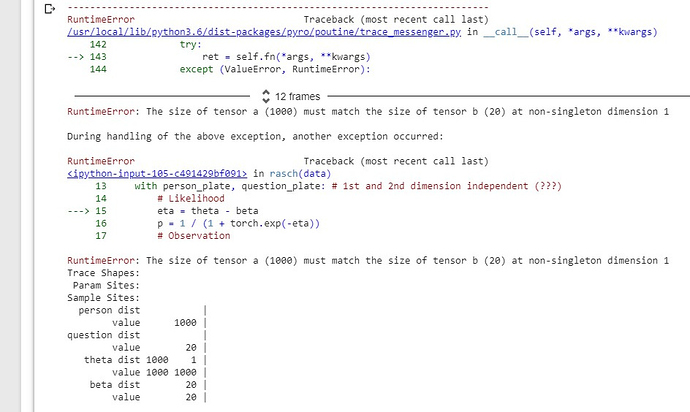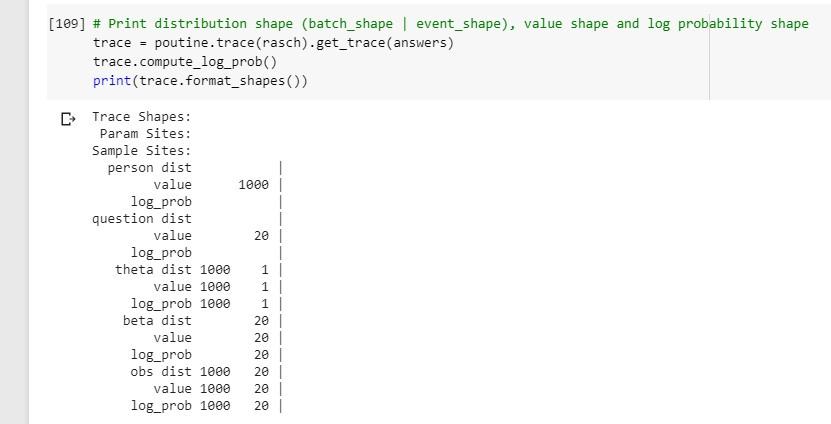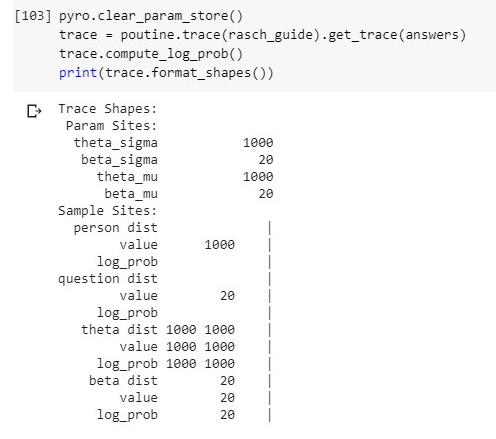Hi!
I’m trying to implement a vectorized Rasch model (for reference: Rasch model).
I get the SVI to function, but achieve no convergence with SGD on the guide specified below. With Adam I achieve convergence but low such. With AutoGuide, SGD convergence is better but precision is still bad. Any suggestions on whether the issue lies with my model or my guide?
Generate data:
n_persons = 1000
n_questions = 20
np.random.seed(543678)
true_theta = np.random.normal(loc=0, scale=1, size=(n_persons,1))
true_theta = np.tile(true_theta, n_questions)
true_beta = np.random.normal(loc=0, scale=1, size=(1,n_questions))
likelihood = np.exp(true_theta - true_beta) / (1 + np.exp(true_theta - true_beta))
answers = np.random.binomial(size=(n_persons, n_questions), p=likelihood, n=1) # calculate answers based on theta and likelihood function
answers = torch.tensor(answers).float() # convert to tensor
Define model:
def rasch(data):
n_persons = data.shape[0]
n_questions = data.shape[1]
person_plate = pyro.plate('person', n_persons, dim=-2)
question_plate = pyro.plate('question', n_questions, dim=-1)
with person_plate:
theta = pyro.sample('theta', pyro.distributions.Normal(0, 1))
assert theta.shape == (n_persons, 1)
with question_plate:
beta = pyro.sample('beta', pyro.distributions.Normal(0, 1))
assert beta.shape == (n_questions,)
with person_plate, question_plate:
# Likelihood
eta = theta - beta
p = 1 / (1 + torch.exp(-eta))
# Observation
obs = pyro.sample('obs', dist.Bernoulli(p), obs=data)
assert obs.shape == (n_persons, n_questions)
return obs, theta, beta
Define guide:
def rasch_guide(data):
n_persons = torch.tensor(data.shape[0])
n_questions = torch.tensor(data.shape[1])
person_plate = pyro.plate('person', n_persons, dim=-2)
question_plate = pyro.plate('question', n_questions, dim=-1)
with person_plate:
theta_mu = pyro.param('theta_mu', torch.tensor(0.))
theta_sigma = pyro.param('theta_sigma', torch.tensor(1.), constraint=constraints.positive)
theta = pyro.sample('theta', pyro.distributions.Normal(loc=theta_mu, scale=theta_sigma))
with question_plate:
beta_mu = pyro.param('beta_mu', torch.tensor(0.))
beta_sigma = pyro.param('beta_sigma', torch.tensor(1.), constraint=constraints.positive)
beta = pyro.sample('beta', pyro.distributions.Normal(beta_mu, beta_sigma))
return {'theta': theta, 'beta': beta}
I also have questions regarding on how to build a model for many posterior parameters, as in this case. I need to be able to extract the posterior beta_mu and beta_sigma, which are as many as there are questions. The only approach I’ve found is sampling from the approximated posterior distribution using the parameterized guide, like so:
posterior_distribution = rasch_guide(answers)
theta_posterior = posterior_distribution['theta']
beta_posterior = posterior_distribution['beta']
print(theta_posterior.shape)
print(beta_posterior.shape)
However, I’m not sure this is a valid approach at all, as the values I obtain have low correlations with the prior data (true values).


